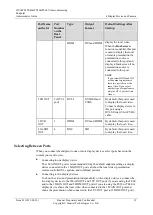
HUAWEI TE40&TE50&TE60 Videoconferencing
Endpoint
Administrator Guide
4 Display Device and Camera
Issue 01 (2013-09-30)
Huawei Proprietary and Confidential
Copyright © Huawei Technologies Co., Ltd.
39
Port Name
on the UI
Port
Number
on the
Rear
Panel
Type
Output
Format
Default Settings After
Startup
HDMI
DVI and HDMI
display the local video.
When the
Dual-screen
function is enabled, this port
is used to display the local
or remote presentation if a
presentation source is
connected to this port and
display a black screen if no
presentation source is
connected to this port.
NOTE
If you select HDMI and DVI
as the output signal source,
these two ports deliver the
same video. If you select
another type of signal source,
only the DVI-I port delivers
videos.
2 SD OUT
2 (DVI-I
port)
DVI-I
S-VIDEO and
CVBS
By default, this port is used
to display the local video.
Connect a display device to
this port using a
DVI-S-Video/VGA/CVBS
cable.
3 DVR
OUT
3
HDMI
DVI and HDMI
By default, this port is used
to display the local video.
4 3G-SDI
OUT
4
BNC
SDI
By default, this port is used
to display the local video.
Selecting Between Ports
When you connect the endpoint to one or more display devices, select ports based on the
content you want to view.
Connecting to one display device
The 1 MAIN OUT port is recommended. Using the default endpoint settings, a display
device connected to the 1 MAIN OUT port can show the local video, presentation,
remote controlled UI, captions, and combined pictures.
Connecting to two display devices
To show the video and presentation independently on two display devices, connect the
two display devices to the 1MAIN OUT and 2 PC OUT ports if you are using the TE60
and to the 1 MAIN OUT and 2 HDMI OUT ports if you are using the TE50 or TE40. A
display device shows the local video when connected to the 1 MAIN OUT port and
shows the presentation when connected to the 2 PC OUT port (or 2 HDMI OUT port).
















































